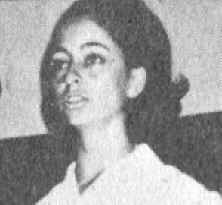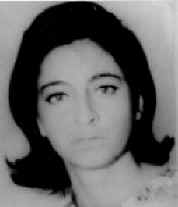REINALDA DEL CARMEN PEREIRA PLAZA


''I thought that now I would be able to find out what happened to my daughter, what happened to her child. She was nearly six months pregnant when she was detained in December 1976. What happened to my grandchild? Was he born or not? Or did they kill both of them? The investigations by Judge Cerda must continue. It's been said that some of 'them' are calling for the Amnesty Law to be applied. That would mean impunity as in so many other cases. It would be another blow to add to the grief we have already suffered. I have shed so many tears over this ... They say that your eyes dry up from so much crying, but it is not true ....''(37) - said the mother of Reinalda del Carmen Pereira Plaza in 1986 during the investigations of Judge Carlos Cerda into the "disappearance" of a number of people including her daughter.
Reinalda del Carmen Pereira Plaza, a medical laboratory technologist and a trade union leader, was violently abducted in Santiago on 15 December 1976 by two armed men who forced her into a car. She was nearly six months pregnant at the time.
She was one of 13 people - 11 members of the Communist Party and two of the Movimiento de Izquierda Revolucionario (MIR), Movement of the Revolutionary Left, arrested between 29 November and 20 December 1976 by members of the security forces. The methods used for arresting the thirteen were similar, in particular that in all but one case, the arrests took place in public. In most of the cases the government's official response to the courts was that the thirteen had crossed into Argentina on foot via the Los Libertadores pass between the end of 1976 and the beginning of 1977.
Witnesses to the arrest of Reinalda del Carmen reported that at about 8.30pm as she was waiting for a bus, a man got out of a Peugeot and grabbed her violently. A second man got out and as she was bundled into the car, she hit her head on the door before being thrown on to the floor of the car. She showed signs of pain and distress and shouted repeatedly for someone to help her. Two men who were identified as belonging to the Military Academy reportedly tried to intervene but were told not to get involved (''en esto no se metan''). The car sped off followed by another in which five security agents were travelling.
On 20 December 1976, Reinalda del Carmen's mother submitted a recurso de amparo (similar to a writ of habeas corpus(38)) to the Santiago Appeals Court. In January 1977, the Ministry of the Interior claimed that according to travel certificate 354, she had left the country on foot on 21 November 1976. The Appeals Court rejected the appeal and passed the case to a criminal court for further investigation. Her mother appealed to the Supreme Court but to no avail. In response to the request for the appointment of a Special Investigating Judge (Ministro en Visita) by the families of the 13 people who ''disappeared'' towards the end of 1976, the Supreme Court appointed a judge to look into eight of the 13 cases. Two other cases were subsequently added(39). The inquiry proceeded without much progress until it was transferred to Judge Carlos Cerda in 1982.
Judge Cerda's persistent and meticulous investigation succeeded in establishing that the documents provided to show that the ''disappeared'' had left the country were falsified and that there was no proof that they had left Chile. The judge was also able to investigate the composition and operations of the so-called Joint Command (Comando Conjunto), which operated from approximately late 1975 until late 1976 in Santiago, coordinating intelligence activities and political repression, including a number of ''disappearances''.
The turning point came in August 1986 when Judge Cerda charged 38 members of the armed forces and another civilian collaborator with ''illicit association''. His investigation was of huge importance for all the cases of ''disappeared'' prisoners. It was the first time since 1973 that a judge, of his own initiative, had successfully investigated a case. For the first time also, a judge had decided to charge not only those personally responsible for the arrests but also their superiors -- including one air force general and former member of the governing junta. As the report of the National Commission for Truth and Reconciliation subsequently recorded, his investigations also made it possible to demonstrate ''that there was a conspiracy between uniformed troops and civilians who were kidnapping, torturing, and murdering people and that this conspiracy had budgets, funding, personnel, buildings and so forth''(40) In addition, it was demonstrated that at least two of these people - Reinalda Pereira Plaza and Edras de las Mercedes Pinto Arroyo - had been arrested by people involved in this conspiracy. Judge Cerda's findings also demonstrated that persistent investigations could shed light on the fate of the ''disappeared''.
Judge Cerda's investigation uncovered information not only about the 10 cases formally allocated to him but also about at least 30 other people detained and ''disappeared'' over the same period. In 1985 the judge asked the higher courts to allow him to take charge of these investigations too - but this request was refused.
The positive developments of Judge Cerda's investigation were however halted when in October 1986 the Chilean Supreme Court upheld a ruling by the Santiago Appeals Court ordering that the charges be dropped and the investigation closed on the basis of the 1978 Amnesty Law. Judge Cerda contested the decision, arguing among other things that the amnesty law could not be applied before penal responsibility had been established. In response, the Supreme Court disciplined the judge with two months suspension from work on half pay. The judge appointed to replace him, immediately closed the case. Lawyers representing the families appealed to the Santiago Appeals Court in June 1987 without success. Finally, on 11 August 1989, the Supreme Court confirmed the permanent closure of the case on the basis of the Amnesty Law.
Nothing is known about the fate of Reinalda del Carmen Pereira Plaza nor whether her baby was born. She was one of nine women who were pregnant at the time of their arrest and ''disappearance''. The names of the other women are: Michelle Peña Herreros, arrested on 28 June 1975 when she was eight months pregnant, María Cecilia Labrín Sazo, arrested on 12 August 1974, six weeks pregnant; Cecilia Miguelina Bojanic Abad, arrested on 2 October 1974, four months pregnant; Mónica Chislayne Llanca Iturra, arrested 6 September 1974, six months pregnant; Gloria Ester Lagos Nilson, detained on 25 August 1974, six weeks pregnant; Jacqueline Paulette Drouilly Yurich, arrested on 30 October 1974, three months pregnant, Nalvia Rosa Mena Alvarado, arrested 29 April 1976, three months pregnant; Elizabeth Mercedes Rekas Urra, arrested on 26 May 1976, four months pregnant.
In January 2001 the families of these women submitted a complaint to investigating Judge Juan Guzmán against Augusto Pinochet and other DINA agents for the act of removing the babies that might have been born in captivity.
Source; Amnesty International – Document: AI Index: AMR 22/014/2001 dated 10 December 2001 – Titled ; CHILE - Testament to suffering and courage: the long quest for justice and truth